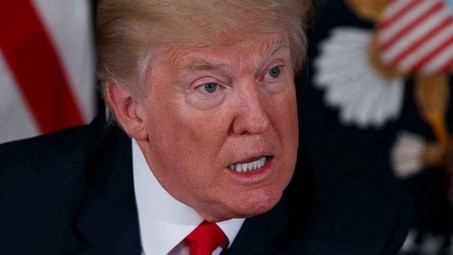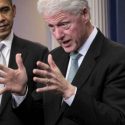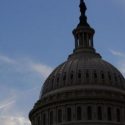President Trump Sends North Korea an Unprecedented Message
The days of ‘strategic patience’ and appeasement are over.
President Donald Trump issued his strongest warning to date to North Korea on Tuesday, after reports surfaced that North Korea had developed a nuclear weapon small enough to fit on a missile. North Korea has already test fired two intercontinental ballistic missiles capable of reaching the United States. “North Korea best not make any more threats to the United States,” President Trump declared in blunt language that contained none of the usual diplomatic mumbo jumbo. “They will be met with fire, fury and frankly power the likes of which this world has never seen before.”
While President Trump hailed the unanimous passage last Saturday of the toughest United Nations Security Council sanctions resolution to date against North Korea, he evidently is running out of patience with North Korea’s intransigence.
Defense Secretary James Mattis issued his own statement on Wednesday, urging the North Korean regime to stand down or face the consequences. “The DPRK should cease any consideration of actions that would lead to the end of its regime and the destruction of its people,” Secretary Mattis’s statement read. “While our State Department is making every effort to resolve this global threat through diplomatic means, it must be noted that the combined allied militaries now possess the most precise, rehearsed and robust defensive and offensive capabilities on Earth.”
North Korea’s leadership does not appear to be getting President Trump’s message. It responded by threatening to attack U.S. personnel and facilities in Guam.
All of this has led to calls by some to de-escalate the rhetoric and negotiate with the North Korean regime. Those sentiments are not only coming from China and Russia. They are coming from the U.S. Congress.
“Isolating the North Koreans has not halted their pursuit of nuclear weapons.” Democrat California Senator Dianne Feinstein said. “And President Trump is not helping the situation with his bombastic comments. In my view, diplomacy is the only sound path forward.” She called for “high-level dialogue without any preconditions” between the United States and North Korea.
What Senator Feinstein and other advocates of unconditional negotiations with North Korea seem to forget is that it was precisely such negotiations with the deceitful North Korean regime that brought us to our present predicament in the first place.
The North Korean nuclear threat emerged as a serious concern initially during former President Bill Clinton’s first term. Clinton vacillated. He finally settled for a fatally flawed deal with North Korea rather than use the leverage the United States possessed at the time to stop North Korea’s incipient nuclear weapons material buildup in its tracks. Barack Obama’s nuclear deal with Iran echoes Clinton’s strategic miscalculation.
When confronted with evidence that North Korea was processing plutonium from a reactor that could be used to build nuclear bombs, Clinton at first considered using military force. “I was determined to prevent North Korea from developing a nuclear arsenal, even at the risk of war,” Clinton wrote in his memoir. Clinton added that he had his Secretary of Defense William Perry talk tough, “even saying we would not rule out a preemptive military strike.” Perry later confirmed that there were serious preparations for a surgical pre-emptive military strike on North Korea’s nuclear facilities. Clinton changed his mind at the urging of former President Jimmy Carter, who went to North Korea with Clinton’s blessing. Carter reached agreement on the outline of what became known as the Agreed Framework freezing and then dismantling North Korea’s plutonium program in return for a lucrative payoff to North Korea. Wendy Sherman was the Clinton administration’s policy coordinator for North Korea and a principal negotiator of the final 1994 Agreed Framework. She re-emerged years later to lead the negotiations on behalf of the United States with Iran that culminated in the deeply flawed nuclear deal with Iran.

“This is a good deal for the United States,” Bill Clinton said at the time regarding the Agreed Framework. “North Korea will freeze and then dismantle its nuclear program. South Korea and our other allies will be better protected. The entire world will be safer as we slow the spread of nuclear weapons.”
Thus began the bait-and-switch game so artfully played by North Korea to lull Clinton, George W. Bush and Barack Obama into thinking that North Korea would agree to freeze or roll back its nuclear weapons and missile programs in response to the right set of carrots and sticks.
Back in 1999, Trump saw the weakness of that approach, but nobody in power was listening. He told NBC’s Tim Russert that, while he would negotiate with North Korea to get the best deal possible, what Clinton had agreed to “was so soft, these people are laughing at us. We virtually tried to bribe them into stopping and they’re continuing to [do] what they’re doing. And they’re laughing at us, they think we’re a bunch of dummies.” Referring to the possibility of using the military option before the nuclear threat posed by North Korea got out of hand, Trump added, “You want to do it in five yearswhen they have warheads all over the place, every one of them pointing to New York City, to Washington and every one of our — is that when you want to do it? Or do you want to do something now?”
In 2002, former President George W. Bush’s administration said North Korea had admitted operating a secret nuclear weapons program in violation of the 1994 agreement. The following year North Korea withdrew from the Nuclear Non-Proliferation Treaty, reactivated its nuclear reactor for plutonium production and declared that it had nuclear weapons. Nevertheless, the Bush administration continued to follow the negotiations route. It participated in six party talks, which culminated in North Korea’s tentative agreement to give up its nuclear program in exchange for energy assistance, including oil, light water reactors and an electric grid.
In 2006, North Korea conducted its first nuclear weapons test. It also test fired its first long range missile. A year later, North Korea returned to the negotiating table, where it extracted a promise of an aid package worth $400 million in exchange for closing its main nuclear reactor. More promises from North Korea followed, including disabling its nuclear weapons facilities, which it did not keep despite reaping even more benefits. The six party talks broke down in December 2008 when North Korea refused to allow international inspectors unfettered access to its suspected nuclear sites.
After Barack Obama became president, North Korea conducted four additional nuclear bomb tests. Obama dithered, relying on toothless UN sanctions resolutions to deter North Korea. He followed a policy his administration called “strategic patience,” hoping the North Korean problem would resolve itself under pressure from the so-called international community. It did not work. North Korea’s nuclear weapons and ballistic missile programs grew by leaps and bounds during Obama’s two terms as president. Instead of trying to curb the North Korean menace, Obama’s “strategic patience” let the North Korean nuclear threat mushroom.
Learning nothing from the horrendous North Korean experience, Obama entered into negotiations with North Korea’s ally and nuclear technology collaborator Iran to slow down Iran’s nuclear program. After making multiple concessions and reaching the disastrous loophole-ridden deal with Iran known as the Joint Comprehensive Plan of Action (JCPOA), Obama described his achievement in terms eerily similar to how Bill Clinton described the Agreed Framework with North Korea two decades earlier.
“Today, because America negotiated from a position of strength and principle, we have stopped the spread of nuclear weapons in this region,” Obama said in praising his deal with Iran. “This deal demonstrates that American diplomacy can bring about real and meaningful change,” Obama added, “change that makes our country and the world safer and more secure.”
The world is far less safe today with a nuclear armed North Korea. This existential threat was made possible when former President Bill Clinton started us down the road of negotiations, followed by his successors, that benefited North Korea economically while buying them time to develop their nuclear weapons and ballistic missile capabilities. Barack Obama made the world even less safe when he fell for the same sleight of hand by Iran. In both cases, kicking the can down the road substituted for intelligent strategic policymaking. President Trump has now inherited both nuclear threats, and appears to be ready to confront them head on free of any blinders.





